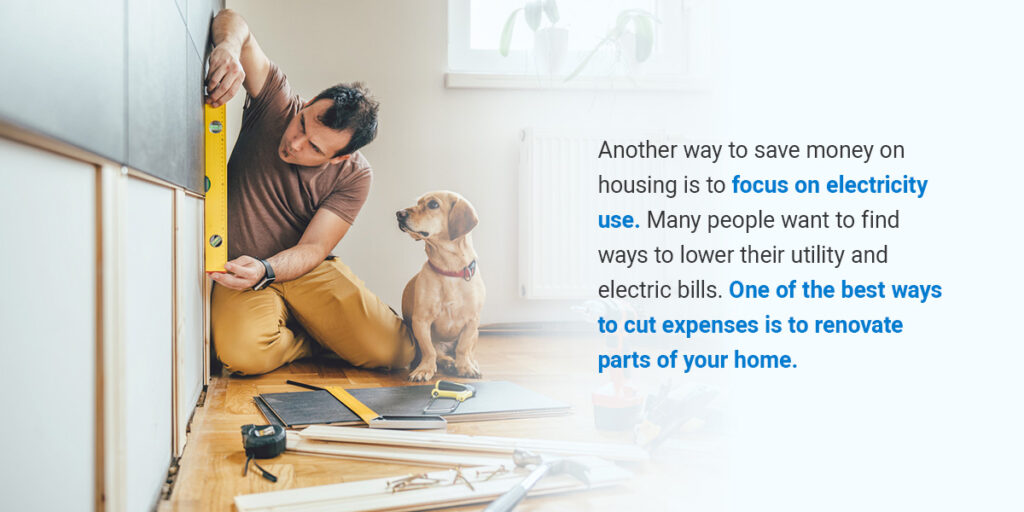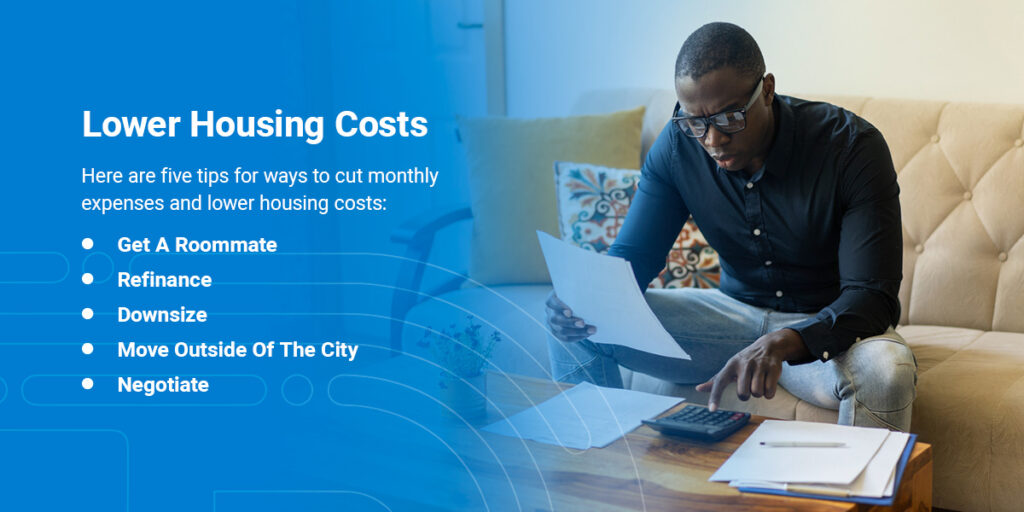
Most Americans can agree on one thing — owning a home can be expensive. House prices in the United States continue to rise, reaching an average cost of $543,600 in 2022. Mortgage rates have increased, too — an average mortgage rate at the beginning of 2023 is 6.48%, nearly double the 2022 rate.
When making mortgage payments, homeowners have to pay for homeowners insurance, principal, taxes and interest. Other recurring costs include:
Luckily, not all costs are fixed for homeowners. By changing some habits, you can find ways to maintain your home and save money. Check out these helpful tips for ways to reduce housing costs.
The good news is that some costs aren’t fixed when it comes to owning a home. You can find ways to change your habits and fix up your home that can save you a lot of money. Check out these helpful tips for ways to cut monthly expenses on your home.

When you are trying to budget for any situation, it’s important to understand your spending first. Find out where your money is going by tracking your spending habits and creating a budget.
Monitoring your spending gives you a starting point for money saving. You can plan your budget more easily when you log every paid expense.
Tracking your spending helps you identify extraneous services or items. It can also reassure you of expenses worth keeping. For instance, you might notice you purchase too many coffees each week or commit to a tanning membership that you only use once a year. Stopping these unnecessary purchases can have positive impacts on your wallet. For example, you could reduce your coffee buying to just once a week or cancel your membership.
If you’ve never tracked your spending, you might not know how to do it. Here are a few strategies you can try:
Once you’ve narrowed down your monthly expenses, it’s time to create a budget for housing and other costs. Decide where to put your earnings by organizing expenses into needs and wants. You can also set aside money toward paying off any debts, like loans and credit cards.
Complete these three essential tasks to make your budget:
You can spend the remaining money after essential expenses in any way you choose. You might put some in your savings account, pay off debt or save toward something fun.
With a budget in place, it becomes easier to identify how you can lower some of your expenses. It may be possible to decrease some large fixed expenses to save money on monthly expenses.

Another way to save money on housing is to focus on electricity use. Many people want to find ways to lower their utility and electric bills. One of the best ways to cut expenses is to renovate parts of your home. Home renovations can be an upfront cost that saves you money over time, and some fixes are simple and affordable. Before you make any big purchases, check these areas in your home to see where you can complete energy-saving renovations:
After you determine the areas of your home you need to fix, compile a list of supplies and appliances to purchase or contractors to schedule to fix your home. Reducing energy usage in your home can save you money, and these tips can help in reducing home energy costs.
Air conditioning units help us stay cool during warmer temperatures. Summer months are typically when people use them the most, and in warmer states, people use them year-round. Although air conditioning units are useful and make homes more comfortable, they can use up a lot of energy and make your energy bills skyrocket. Your AC unit is responsible for a large portion of your home’s energy usage.
The harder your AC unit works, the more electricity it uses. Air conditioning units work overtime during the hot months and can cost you the most money in this season. They can also overwork when they need repairs or maintenance. It’s important to understand when your AC unit needs a tune-up. For instance, these warning signs can indicate something is wrong with your unit:
You may be able to reduce your energy bill by making one of the following changes to your AC unit:
The heat and air system control the temperature of your entire home. You can start reducing home energy costs by using a smart thermostat.
Heating and air units will continue to heat and cool spaces that you don’t use often and cost you money. A programmable thermostat can help you control the temperature in your home without overusing your unit. These thermostats work by decreasing the amount of energy your heating and air unit uses while you are away from your home or while you are sleeping. Installing a programmable thermostat can help you save money on your utilities in the long run.
A few fixes to your home’s water and plumbing can sometimes lower your utility bills. Low-flow fixtures are smart solutions to bring down the cost of water and sewage bills. These pieces of plumbing equipment can decrease the amount of water your traditional appliances use. You can find low-flow fixtures for various areas of your bathroom, like showerheads, toilets, faucets and other common household plumbing fixtures.
The financial benefits of installing these appliances in your bathroom may be noticeable on your utility bills. Using low-flow fixtures can help reduce water, sewage and electric bills.
Home appliances and lighting fixtures have become more energy-efficient over the years. You want appliances that work efficiently and last many years. Although high-efficiency appliances may cost more upfront, they’ll save you money over time. You’ll likely see your utility bills decrease as you install more energy-efficient home appliances, like refrigerators, ovens, washer and dryer machines, microwaves and more.
It’s also important to have energy-saving light fixtures in your home. You can purchase lightbulbs that use less energy than traditional bulbs and set timers on fixtures, like lamps, outdoor lights and other overhead lights in your home.
A crucial part of increasing your home’s energy efficiency is eliminating leaks or cracks. Cracks and leaks commonly occur over time, and you may not notice them. You’ll see their impact on your utility bill and can lower monthly expenses when you address them.
You can easily fix broken seals and cracks in your home with a caulk gun, new seals and weatherstripping. This fix will help keep temperature-controlled air from escaping. Fixing seals can help your AC unit run efficiently and not have to work harder than it needs to for a comfortable home.

Whether it’s too cold or hot outside, changing temperatures call for using your heating and air unit. To keep your AC and heating system from overworking and raising your energy bills, ensure your home is adequately insulated. Home insulation can help stop the transfer of heat in and out of your house. You can use materials like polystyrene, fiberglass and other popular types of insulation.
Save energy by adding insulation to your walls, attic, and basement or crawl spaces.
If your house is constantly being hit by the sun all day, the temperature in your home can become hotter. Even with great insulation, sun exposure during the hot summer months can make your AC unit work double time. A smart solution to protect your home from the sun is to plant large trees in your yard to shade your house. Trees like birches, maples and willows are popular trees that grow to a large size and look lovely in your yard.
Your washer and dryer are responsible for a significant amount of energy usage in your home and can raise your utility bills. You can reduce home costs by using a clothing rack to dry your clothes instead of an electric or gas dryer. Although it may not be as efficient as using a dryer, a clothesline has other benefits. Especially if you have a bigger family, using clothes racks can be cost-effective and help you save money on monthly utilities.

Fixed home costs can take up a majority of your budget and average household costs. Here are five tips for ways to cut monthly expenses and lower housing costs:
Taking in a roommate can help significantly lower your monthly payments towards your mortgage. If you have an extra room in your home, ask a friend, sibling or someone new to rent out a room in your living space. You’ll also be able to share expenses on:
If you choose to refinance your mortgage loan, you may be able to lower your monthly payments. Interest rates are always changing, so it can be great to refinance if the current interest rate is lower than your current rate. By refinancing your loan, you can lower your mortgage payments, decrease the interest you pay or even pay off your home loan more quickly. In addition, you could use your equity to take out cash.
If you’re concerned about high home costs, consider your home’s size. Could you live comfortably in a smaller space? If so, you can decrease your monthly expenses by moving into a smaller home. Downsizing is a great option for empty nesters because you can save a lot of money while still living in a comfortable space.
A well-known saying from people involved in real estate is “Location, location, location.” Homes close to big cities are in high demand. And where the demand for a living space is high, the prices increase. To save some money on your monthly payments, consider moving farther from the city. Home prices in smaller towns and suburbs outside the city can be more affordable than a place in a downtown area.
If you’re a renter and it’s time to re-sign your lease, think about negotiating the rent price with your landlord. Landlords prefer to keep good tenants in their buildings or home. It’s easy for them and often costs less to keep you as a tenant than to find someone new. Research similar rental places in your area and present a fair rental price for the next lease agreement.

Debt consolidation is when you take out a new loan to pay off your other debts and combine them into one payment. If you can get a lower interest rate through the loan, you’ll have a lower payment and pay all your debt in one place.
Debt consolidation makes handling your debt more manageable and organized. You can combine different loans, like home loans and credit cards, so you don’t have to stress over multiple bills.
You may want to consider this method if you fulfill the following:
If you are making payments on time for your credit cards and other outstanding debts and have a great credit score, applying for a debt consolidation loan may be the right choice for you.
Debt consolidation may not be a wise choice if you have problems with debt or a tendency for excessive spending. It also may not be an ideal decision if you can pay the debt you have in a short amount of time without consolidating.

Many people can agree that the biggest obstacle to organizing finances is finding a way to spend less money. Looking for ways to cut expenses can help you extend your spendable money and pay off debts and loans. Even if an expense may seem small and insignificant, cutting a few of those payments can help cut your home costs.
Cut monthly expenses by considering these lifestyle changes:

Reducing home insurance costs is another method of achieving lower housing costs. If you want to save money on your insurance, take a look at your current policy and see if the insurance company offers reduced rates for completing home improvements, like upgrading your heating and air unit.
You can also decide to raise your deductible, which can save on your premium. It’s good to shop around for homeowners insurance and compare another company’s rates to your current policy.

Reducing your home costs involves different aspects of your finances. It’s easier to decrease your payments in some areas, but in others, you might need a little more assistance. To find the best insurance policies and lowest rates, check out David Pope Insurance. We can find affordable homeowners insurance policies that can help reduce your monthly expenses.
Customers can count on our agents to help find a policy that fits their needs. You can request a quote for home insurance or contact us to learn more about the policies we offer and how we can provide affordable rates.